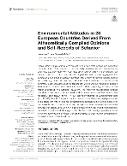Environmental Attitudes in 28 European Countries Derived From Atheoretically Compiled Opinions and Self-Reports of Behavior

Publication date
2022Published in
Frontiers in Psychology [online]Volume / Issue
13 (5.7.2022)ISBN / ISSN
ISSN: 1664-1078Metadata
Show full item recordCollections
This publication has a published version with DOI 10.3389/fpsyg.2022.875419
Abstract
People differ in their personal commitment to fighting climate change and protecting the environment. The question is, can we validly measure people's commitment by what they say and what they claim they do in opinion polls? In our research, we demonstrate that opinions and reports of past behavior can be aggregated into comparable depictions of people's personal commitment to fighting climate change and protecting the environment (i.e., their environmental attitudes). In contrast to the commonly used operational scaling approaches, we ground our measure of people's environmental attitudes in a mathematically formalized psychological theory of the response process-the Campbell paradigm. This theory of the response process has already been extensively validated, and its relevance for manifest behavior has repeatedly been shown as well. In our secondary analysis of Eurobarometer data (N = 27,998) from 28 European countries, we apply the Campbell paradigm to a set of indicators that was not originally collected to be aggregated into a single scale. With our research, we propose a distinct way to measure behavior-relevant environmental attitudes that can be used even with a set of indicators that was originally atheoretically compiled. Overall, our study suggests that the Campbell paradigm provides a sound psychological measurement theory that can be applied to cross-cultural comparisons in the environmental protection domain.
Keywords
environmental attitude, attitude measurement, attitude-behavior consistency, Campbell paradigm, green consumption, cross-cultural comparison
Permanent link
https://hdl.handle.net/20.500.14178/1784License
Full text of this result is licensed under: Creative Commons Uveďte původ 4.0 International







